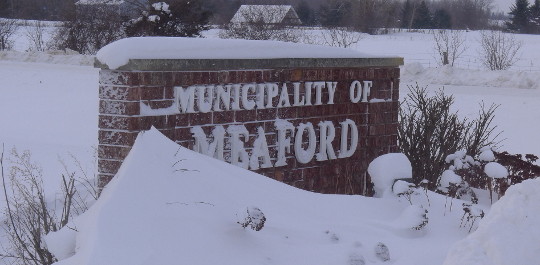Stephen Vance, Staff
Last winter the Municipality of Meaford made some adjustments to its winter road control practices and procedures which have resulted in significant financial savings. At their January 23 meeting, Meaford councillors were provided with an update on the initiative by Treasurer Darcy Chapman.
“In April of 2015, Council was presented an Operations Review of Winter Maintenance, Roadway Maintenance and Fleet Management final report by DFA Infrastructure International Inc. The report highlighted 17 recommendations in the areas of Outsourcing, Policies & Practices, Effective & Efficient Service Delivery, and Recruitment,” Chapman told council in his report. “The report also outlined 12 key challenges including aging infrastructure and fleet, continuous improvement, overtime, salt use, and patrol yard silos.”
Between January 1 and April 15, 2016, Meaford’s Transportation Services department embarked on an initiative to implement innovative approaches using ’30-Day Challenges’, during which ideas were tested for a period not to exceed 30 days.
Chapman told council on January 23, that though there have been complaints from residents, the initiatives undertaken by the department have been working well, and Meaford’s roads have been well maintained, and safe for travel.
“Given the changes to routing and scheduling as approved by Council through the SDR process, front line administrative and transportation services staff have had to manage a number of concerns and complaints regarding the change in service delivery,” Chapman noted.
In spite of some complaints, Chapman told council that the changes that have been implemented have resulted in significant cost savings.
“Based on the changes to past practices by ensuring application rates are adjusted to reflect best practice standards in an effort to avoid over-application of products will save approximately $140,000 per year in salt over a typical winter control season consisting of +/- 80 events,” Chapman informed council in his written report.
In addition to savings in salt, Chapman said that the optimization of plow routes included a reduction of the number of routes from 13 to 10, and combined with revised scheduling which now sees consistent plow service from 4 a.m. through 11 p.m., has saved even more money.
“The cost related to fleet replacement, maintenance and operations based on annualized plow truck replacements, insurance, maintenance, licencing, etc. per vehicle is $26,600 or a total saving of $83,000 per year for three (fewer) vehicles, including general overhead costs,” Chapman noted. “Based on changes to weekend scheduling there will be significant savings in overtime accumulation of approximately 1,500 hours resulting in savings of about $37,000 annually.”
In previous years all road control staff were deployed to complete one of the 13 routes with only a skeleton crew of seasonal staff remaining for afternoon and evening operations, Chapman told council.
“The reduced routing and revised schedule will see staff reporting at 4 a.m., 7 a.m., or 3:30 p.m., allowing a more consistent level of service from 4 a.m. to 11 p.m.,” explained Chapman.
Financial considerations aside, Chapman noted that the changes in salt use will have significant environmental implications.
“In the past, annual salt use through direct application or mixed with sand was in excess of 3,000 tonnes during the past three winter control seasons (2012-13, 2013-14, 2014-15). Reducing the Municipality’s salt use by 60 percent has limited over 2,000 tonnes of salt potentially running off into storm water catch basins, ditches, streams and rivers and eventually into Georgian Bay,” Chapman explained.
To help improve communication between the department and the public, Chapman said that a full communication plan was developed that included an interactive online map that allows residents to learn about road classifications and minimum maintenance standards and service level expectations.
“In an effort to track positive feedback along with concerns, complaints and potential issues, a fillable form was developed for the website and hard copies were made available at various municipal facilities. Lastly, an email, roadsinquiry@meaford.ca was established to allow for another venue for public interaction for non-emergency concerns. The overall feedback was invaluable as a means to understand potential service level concerns as various methods were tested,” Chapman explained in his report to council.
During the 2015-16 winter control season, Chapman said the municipality received 79 written submissions through email and the website via the fillable comment form. As well, approximately 120 phone calls were logged, with virtually all relating to concerns and complaints rather than positive feedback.












